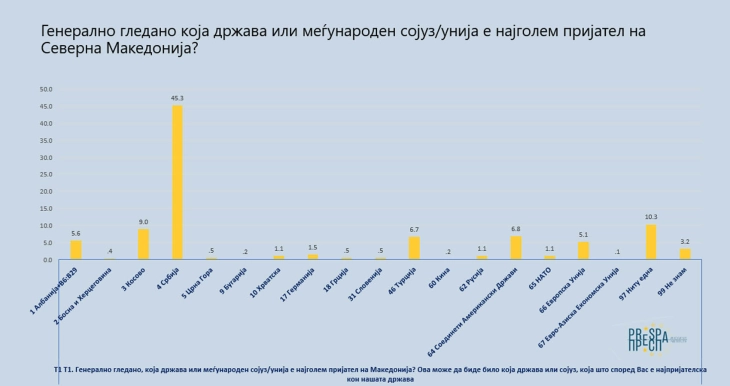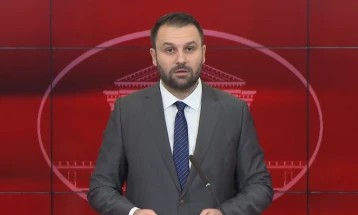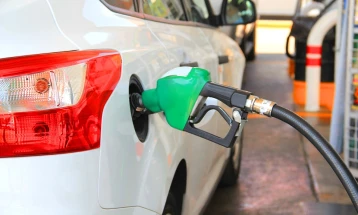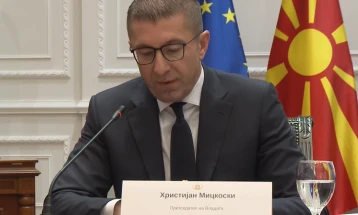Serbia friendliest country, U.S. contributes most to democracy, EU to economic development: survey
- Citizens of North Macedonia perceive Serbia as the friendliest country, the United States tops the list regarding its contribution to the country's democratic development, while the European Union contributes most to the economic development, show preliminary results of a survey conducted by the Prespa Institute in period April-May, at a sample of 1,500 respondents.
- Post By Ivan Kolekevski
- 15:54, 25 May, 2023

Skopje, 25 May 2023 (MIA) - Citizens of North Macedonia perceive Serbia as the friendliest country, the United States tops the list regarding its contribution to the country's democratic development, while the European Union contributes most to the economic development, show preliminary results of a survey conducted by the Prespa Institute in period April-May, at a sample of 1,500 respondents.
"The survey shows that Serbia continues to be our most recognizable and most perspective friend, rising from 14 percent in 2020 and 38.6 percent in 2022. The most important criterion for the citizens on who is a friend or not is primarily the shared interests and values, not necessarily the democratic contribution or economy and cooperation with the respective state," says Ivana Jordanovska of the research team.
Serbia is followed by Kosovo (9 percent), United States (6.8 percent), Turkey (6.7 percent), Albania (5.6 percent), EU (5.1 percent), Germany (1.5 percent), NATO (1.1 percent), Russia (1.1 percent), Greece and Montenegro (0.5 percent) and Bulgaria and China (0.2 percent). No country is perceived as friendly by 10.3 percent of respondents, while 3.2 percent failed to answer.

Prespa Institute's Andreja Stojkovski said the trend is owed to the developments during the Covid-crisis and settlement of the dispute between the Serbian and Macedonian orthodox churches. On the other hand, EU has recorded the biggest drop (16.7 percent in 2020, 7.8 percent in 2022) and Germany (12.4 percent in 2020, 5.9 percent in 2022).
"The list experiment showed that citizens would most often click positive news about Russia, positive and negative news about the EU, frightening news about vaccines, and believe negative news about the EU," added Jordanovska.
Regarding the country that has contributed the most to North Macedonia's democratic development, the U.S. tops the list with 24.2 percent, followed by EU (22.8 percent), and Serbia (14.7 percent).
On the largest contributor to the country's economic development, EU is perceived by 21.2 percent of respondents, then Serbia (15.9 percent) and the United States (15.6 percent).
"Compared to last year's data, when Germany was seen as a second or third partner in the section of economic and democratic development, this is not the case this year. Germany's contribution in the democratic development has dropped to 2.7 percent and from 26.8 to 10.7 percent when it comes to the economy," said Jordanovska.

Sixty-one percent of respondents see the EU as the best option for North Macedonia, while 34 percent believe the country should find other alternatives. Almost 90 percent of those who think EU is the best option believe it brings economic development and new jobs, followed by the rule of law, observance and protection of human rights, and countering corruption.
Forty-nine percent of those who think North Macedonia should seek other alternatives believe history and identity would otherwise change, 41 percent say the country loses more than it gains, 32 percent say values with the EU differ, while 29 percent claim the Macedonian language would be lost.
Regarding the sources of information on foreign policy and Euro-integration issues, 48 percent of respondents opted for TV, 23.3 percent through social networks, 18.5 percent from web-portals, 2.2 percent from web browsers and 1.6 percent from newspapers.
In addition, two-thirds of respondents believe news acquired from media are neither true nor false.
Sitel is the most trusted TV station (19.8 percent of respondents), followed by Kanal 5 (12.9 percent), Alsat (12.4), Alfa (7.1), Telma (6.9), MTV (6.7), 24 Vesti (5.1), local TV stations (2.4 percent) and TV21 (2 percent).
Photo: MIA







